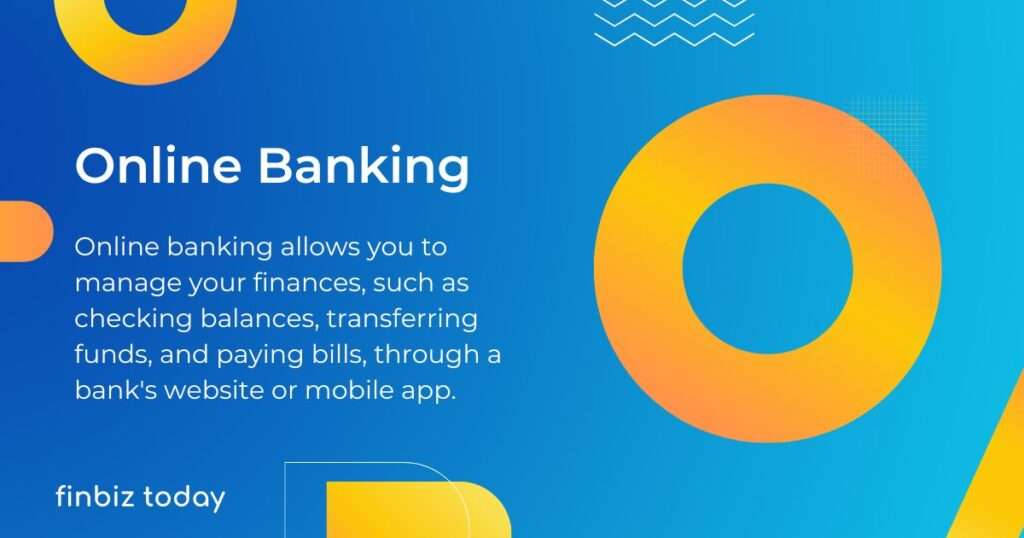In the modern era of technology, online banking stands as an essential component in overseeing personal finances. From transferring funds to paying bills, online banking offers convenience and accessibility like never before.

What is Online Banking?
Online banking, also known as internet banking, refers to the digital platform provided by banks and financial institutions that enables customers to conduct various banking transactions and manage their accounts over the internet. It allows users to access their accounts, check balances, transfer funds, pay bills, and more, all through a secure online portal.
How does Online Banking Work?
Online banking works by providing customers with secure access to their accounts through a bank’s website or mobile app. Users log in using their credentials, such as username and password, and can then perform a wide range of transactions and account management tasks. These tasks include checking account balances, transferring funds between accounts, paying bills, setting up automatic payments, viewing transaction history, and even depositing checks remotely using mobile deposit features.
Meaning of Online Banking
The meaning of online banking is the process of conducting financial transactions and managing bank accounts over the internet.
Definition of Online Banking
The definition of online banking is the same as its meaning, referring to the process of conducting financial transactions and managing bank accounts over the internet.
Example of Online Banking
An example of online banking includes accessing your bank account through the bank’s website or mobile app to check balances, transfer funds, pay bills, and more.
Benefits of Online Banking
Online banking offers numerous benefits, including:
Convenience: It is a hallmark of online banking, granting users the flexibility to manage their financial affairs at any time and from any location, without the necessity of visiting a physical bank branch.
Accessibility: Access to account information and banking services is available 24/7, allowing users to stay connected to their finances on their own terms.
Cost Savings: Online banking often eliminates the need for paper statements, postage fees, and in-person banking fees, resulting in potential cost savings for customers.
Efficiency: Transactions can be completed quickly and easily with just a few clicks or taps, saving time and effort.
Enhanced Services: Online banking platforms offer a variety of features, such as account alerts, budgeting tools, financial management apps, and online bill pay, to help users better manage their money.
Types of Online Banking
Online banking encompasses various types, including:
Internet Banking: Accessed through a web browser on a computer, internet banking allows users to manage their accounts and conduct transactions via a bank’s website.
Mobile Banking: Mobile banking involves accessing banking services through a mobile device, such as a smartphone or tablet, using a dedicated mobile app provided by the bank.
Online-only Banks: These banks operate entirely online, without physical branch locations, and offer banking services exclusively through online platforms.
How does Online Banking Differ from Internet Banking?
Online banking is the overarching term that encompasses both internet banking and mobile banking. Internet banking specifically refers to banking services accessed through a web browser on a computer.
How does Online Banking Distinguish itself from Mobile Banking?
Online banking includes both internet banking and mobile banking. Internet banking refers to accessing banking services through a web browser on a computer, while mobile banking allows users to access banking services using a mobile device through a dedicated app provided by the bank.
Difference between a Bank and an Online Banking
A bank is a financial institution that offers various financial services, including banking, lending, and investment services. Online banking, on the other hand, is the digital platform provided by banks to allow customers to access banking services over the internet.
How Safe is Online Banking?
Online banking employs various security measures to protect users’ information and transactions, such as encryption, multi-factor authentication, and fraud monitoring systems. While no system is entirely foolproof, online banking is generally considered safe when using reputable and secure platforms.
How do I Access Online Banking?
To access online banking, you can visit your bank’s website or download their mobile app. Then, log in using your credentials provided by the bank to access your accounts and perform transactions.
Is Online Banking better than regular Banking?
The choice between online banking and regular banking depends on individual preferences and needs. Online banking offers convenience and accessibility, while regular banking may provide more personalized service through face-to-face interactions at physical branches.
Online Banking Services
Online banking services include various features and functionalities provided by banks through their digital platforms, such as account access, fund transfers, bill payments, account alerts, budgeting tools, and more.
Advantages and Disadvantages of Online Banking
Advantages:
Convenience: Access accounts and services anytime, anywhere.
Cost Savings: Save on paper statements, postage, and in-person banking fees.
Efficiency: Complete transactions quickly and easily without visiting a physical branch.
Enhanced Services: Enjoy features like account alerts, budgeting tools, and online bill pay.
Disadvantages:
Security Risks: Potential for identity theft, phishing scams, and cyberattacks.
Technical Issues: Connectivity issues or system outages may disrupt online banking services.
Lack of Personal Interaction: Limited face-to-face interaction with bank staff for personalized assistance.
Conclusion
Online banking offers unparalleled convenience and accessibility for managing personal finances in today’s digital age. By understanding how online banking works, its benefits, and potential drawbacks, users can make informed decisions to leverage this powerful tool effectively. Whether accessing accounts through a computer or mobile device, online banking empowers individuals to take control of their financial lives with ease and confidence.

